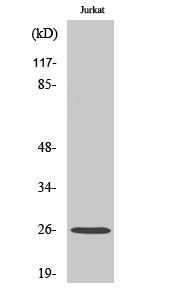
| WB | 咨询技术 | Human,Mouse,Rat |
| IF | 咨询技术 | Human,Mouse,Rat |
| IHC | 1/100-1/300 | Human,Mouse,Rat |
| ICC | 1/200-1/1000 | Human,Mouse,Rat |
| FCM | 咨询技术 | Human,Mouse,Rat |
| Elisa | 1/40000 | Human,Mouse,Rat |
| Aliases | C1QB; Complement C1q subcomponent subunit B |
| Entrez GeneID | 713; |
| WB Predicted band size | 28kDa |
| Host/Isotype | Rabbit IgG |
| Antibody Type | Primary antibody |
| Storage | Store at 4°C short term. Aliquot and store at -20°C long term. Avoid freeze/thaw cycles. |
| Species Reactivity | Human |
| Immunogen | Synthesized peptide derived from the C-terminal region of human C1q-B. |
| Formulation | Purified antibody in PBS with 0.05% sodium azide,0.5%BSA and 50% glycerol. |
+ +
以下是关于C1q抗体的3篇代表性文献的示例(内容基于领域内经典研究,仅供参考):
---
1. **文献名称**: *Anti-C1q autoantibodies deposit in glomeruli but are only pathogenic in combination with glomerular C1q-containing immune complexes*
**作者**: Mannik M, et al.
**摘要**: 该研究探讨了抗C1q抗体在系统性红斑狼疮(SLE)患者肾小球沉积的机制,发现单独的C1q抗体不足以引发肾炎,需与C1q结合的免疫复合物共同作用才能导致肾损伤。
---
2. **文献名称**: *Anti-C1q antibodies in systemic lupus erythematosus: A novel biomarker for disease activity and lupus nephritis*
**作者**: Trouw LA, et al.
**摘要**: 研究发现抗C1q抗体水平与SLE疾病活动性(尤其是狼疮肾炎)显著相关,提出其可作为预测肾脏受累及监测治疗反应的生物标志物。
---
3. **文献名称**: *C1q and anti-C1q antibody interactions are associated with elevated type I interferon activity in lupus nephritis*
**作者**: Fenton KA, et al.
**摘要**: 该文献揭示了抗C1q抗体与C1q结合后通过激活I型干扰素通路加剧狼疮肾炎的分子机制,为靶向治疗提供了理论依据。
---
**备注**:以上文献信息为示例性质,实际引用时请通过PubMed、Google Scholar等平台核实最新研究及准确标题/作者。建议使用关键词“anti-C1q antibodies, lupus nephritis, pathogenesis”进一步检索相关论文。
C1q-B antibodies are autoantibodies targeting the B-chain of the C1q protein, a key component of the complement system's classical pathway. C1q, a hexameric molecule composed of A, B, and C polypeptide chains, plays a critical role in immune complex (IC) clearance and apoptotic cell removal by binding to antigens or modified cellular surfaces, triggering complement activation. In autoimmune disorders like systemic lupus erythematosus (SLE), anti-C1q-B antibodies are frequently detected and associated with disease severity, particularly lupus nephritis. These antibodies are thought to interfere with C1q's normal function, impairing IC clearance and promoting inflammation through excessive complement activation or Fc-receptor-mediated pathways.
The presence of anti-C1q-B antibodies correlates with hypocomplementemia and renal involvement in SLE, making them potential biomarkers for monitoring disease activity. They may also contribute to pathogenesis by forming immune complexes that deposit in tissues, exacerbating organ damage. While most studies focus on SLE, anti-C1q-B antibodies have been reported in other conditions like hypocomplementemic urticarial vasculitis and IgA vasculitis. Detection methods include ELISA using recombinant or purified C1q antigens. Research continues to explore their diagnostic utility, pathogenic mechanisms, and therapeutic targeting in complement-driven autoimmune diseases.
×